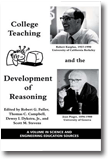
College Teaching and the Development of Reasoning
Edited by:
Robert G. Fuller, University of Nebraska Lincoln
Thomas C. Campbell, Illinois Central College
Dewey I. Dykstra Jr., Boise State University
Scott M. Stevens, Carnegie Mellon University
A volume in the series: Science & Engineering Education Sources. Editor(s): Mark J. Lattery, University of Wisconsin Oshkosh.
Published 2009
This book is intended to offer college faculty members the insights of the development of reasoning movement that enlighten physics educators in the late 1970s and led to a variety of college programs directed at improving the reasoning patterns used by college students. While the original materials were directed at physics concepts, they quickly expanded to include other sciences and the humanities and social sciences. On-going developments in the field will be included.
The editors have introduced new topics, including discussions of Vygotsky's ideas in relation to those of Piaget, of science education research progress since 1978, of constructivist learning theory applied to educational computer games and of applications from anthropology to zoology. These materials are especially relevant for consideration by current university faculty in all subjects.
CONTENTS
Introduction and History. Chapter 1. How Students Reason. Chapter 2. Concrete and Formal Reasoning. Chapter 3. Formal Reasoning Patterns. Chapter 4. Interviews of College Students. Chapter 5. College Student Research Findings. Chapter 6. Analysis of Test Questions. Chapter 7. Analysis of Textbooks. Chapter 8. Self-Regulation. Chapter 9. The Learning Cycle. Chapter 10. Teaching Goals and Strategies. Chapter 11. Implementation. Chapter 12. Progress since 1978. Chapter 13. Theoretical Foundations for College Learning: Sorting Fact from Fiction. Chapter 14. College Programs. Bibliography. Appendix A Additional Readings. Appendix B Physics Teaching and Development of Reasoning Materials © 1975 AAPT. Index
REVIEWS
"Far too many college freshmen enroll with poorly developed reasoning skills. And most college and university instructors are still unaware of the extent of the problem and its solution. So they continue to emphasize the transmission of information to the detriment of student intellectual development. Unfortunately, in the USA at least, most college instructors are not hired for their pedagogical awareness and expertise. Rather they are hired for their subject matter and research expertise. So they continue in their ignorant bliss to teach the wrong things in the wrong way. And future teachers continue to teach as they have been taught. Consequently, in spite of near universal agreement among pedagogical experts that a serious problem remains and that a pedagogical solution exists, no easy way has been found to implement that solution on the broad scale that is necessary. Nevertheless, a good start could be made by making the present book required reading for all college and university instructors." Anton E. Lawson Arizona State University
"With its inclusion of more recent theoretical perspectives and empirical research, the book provides not only a wonderful look at where we have been, but an insightful critique of where we are now." Anton E. Lawson in Springer Review
MORE INFORMATION
> Read an excerpt from this book
-
Paperback978-1607522362
Web price: $45.04 (Reg. 52.99)
-
Hardcover978-1607522379
Web price: $80.74 (Reg. 94.99)
- eBook9781617352461

- EDU015000 - EDUCATION: Higher
- EDU029030 - EDUCATION: TEACHING METHODS & MATERIALS: Science & Technology
- EDU037000 - EDUCATION: Research
-
 Deep Learning in Introductory Physics
Exploratory Studies of Model‐Based Reasoning
Deep Learning in Introductory Physics
Exploratory Studies of Model‐Based Reasoning
-
 Developing Science Literacy in the 21st Century
Developing Science Literacy in the 21st Century
-
 Rethinking Science Education
Philosophical Perspectives
Rethinking Science Education
Philosophical Perspectives
-
 Successful Science and Engineering Teaching in Colleges and Universities, 2nd Edition
Successful Science and Engineering Teaching in Colleges and Universities, 2nd Edition
-
 The Handbook for Aspiring Higher Education Leaders
The Handbook for Aspiring Higher Education Leaders
-
 Using and Developing Measurement Instruments in Science Education
A Rasch Modeling Approach 2nd Edition
Using and Developing Measurement Instruments in Science Education
A Rasch Modeling Approach 2nd Edition
-
 Using and Developing Measurement Instruments in Science Education
A Rasch Modeling Approach
Using and Developing Measurement Instruments in Science Education
A Rasch Modeling Approach

